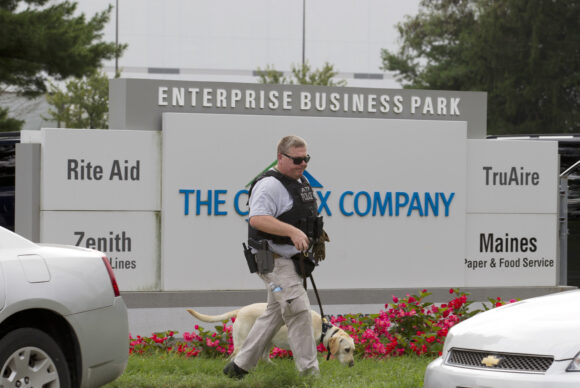Rite Aid is not liable for a mass shooting that killed three workers at a warehouse in Maryland; not because it was protected by workers’ compensation immunity, but because the plaintiffs did not show the tragedy could have been foreseen or that inadequate security was provided, the Maryland Appellate Court ruled in an opinion published Tuesday.
The appellate panel affirmed a decision by the Baltimore County Circuit Court to grant summary judgment in favor of Rite Aid in a lawsuit filed by contract workers who were injured during the September 2018 shooting. The panel, however, said the trial court erred by determining the claims were barred by workers’ compensation exclusive remedy.
The panel found the trial court had correctly ruled that the plaintiffs did not show that Rite Aid was on notice that the shooter posed a threat of violence. Also, the plaintiffs failed to show that the temporary employment company that employed the shooter, Abacus Corp., was negligent by hiring her.
The opinion says “the record reflects that Abacus conducted a reasonable inquiry into (the shooter’s) fitness as an employee that simply failed to reveal certain red flags which tend to evade most standard background checks.”
Snochia Moseley, an employee of Abacus, was assigned to work at a warehouse that Rite Aid leased in Aberdeen, Maryland. She had completed only eight shifts at the warehouse on Sept. 20, 2018 when she quarreled with coworkers after cutting in front of them to punch in to begin her shift.
After that altercation, Moseley left the warehouse briefly and used her employee identification badge to reenter the facility, this time armed with a handgun. Once inside she opened fire, killing three workers and injuring three others. Moseley killed herself by firing a round into her head before law enforcement arrived at the scene.
After the shooting, Moseley’s domestic partner told law enforcement officers that Moseley was schizophrenic, bipolar, suffered delusions and once had threatened her with a gun.
The three injured workers, Haissaun Mitchell, his brother Shyheim Mitchell and his uncle Michael Mitchell, filed a lawsuit against Rite Aid and Abacus. They also received workers’ compensation benefits through their employer, Capstone Logistics. The company contracted with Rite Aid to unload trucks at the warehouse.
The Baltimore County Circuit Court granted summary judgment in favor of the defendants, finding that the plaintiffs had failed to submit evidence that Abacus was negligent in its hiring or that Rite Aid should have foreseen the shooting spree and provided security inadequate to prevent it. The court also found the Rite Aid was entitled to workers’ compensation immunity as the plaintiffs’ joint employer.
The Mitchells appealed.
The appellate panel found that the Baltimore County court erred by finding workers’ compensation immunity barred the Mitchell’s claims against Rite Aid. The drug store chain did not directly supervise Capstone’s workers, the opinion says. Its contract with Capstone required Capstone to provide workers’ compensation insurance and stated that Capstone was solely responsible for its own employees. Capstone workers did not attend morning meetings with other workers assigned to work at the Rite Aid warehouse. They also wore special yellow vests to set themselves apart from other workers.
However, the appellate panel found that the Circuit Court had correctly granted summary judgment on the grounds that there were no red flags that would have put Rite Aid on notice that the shooting was imminent. There has been no similar incidents of workplace violence at the facility and Moseley’s behavior during her short time at the warehouse provided no clues of potential violence.
Also, the pleadings did not cite sufficient evidence to show that Abacus was negligent by hiring Moseley, the panel’s opinion says. While Moseley’s partner told law enforcement officers that Moseley was schizophrenic and bi-polar, she had no criminal record and she tested negative on a pre-employment drug test.
The opinion, however, includes a note of warning that employers may not always escape liability for mass shootings.
“We caution that, as grim statistics and the development of the law in our sister states foreshadow, the standards of care surrounding a business owner’s duty to protect invitees from gun violence are not static and will continue to evolve in light of ‘common sense perceptions of the risks created by various conditions and circumstances,'” the opinion says, citing a previous court decision.
Top photo: In this Sept. 20, 2018, file photo, ATF police officer with a sniffing dog walks out the industrial complex in Harford County, Md. The girlfriend of Snochia Moseley, who gunned down three co-workers at a Maryland warehouse, told investigators that her companion was prone to violent outbursts, heard voices in her head and had threatened her with a gun before September’s rampage, according to a police report obtained by The Associated Press. (AP Photo/Jose Luis Magana, File)
Was this article valuable?
Here are more articles you may enjoy.


 Gas-Guzzler Revival Risks Dead-End Future for US Automakers
Gas-Guzzler Revival Risks Dead-End Future for US Automakers  Meta Loses Insurance for Defense in Major Social Media Addiction Litigation
Meta Loses Insurance for Defense in Major Social Media Addiction Litigation  NYC Travel Snarled by Snow as Central Park Gets 15 Inches
NYC Travel Snarled by Snow as Central Park Gets 15 Inches  Live Nation’s Settlement Efforts Stalled Ahead of DOJ Trial
Live Nation’s Settlement Efforts Stalled Ahead of DOJ Trial 